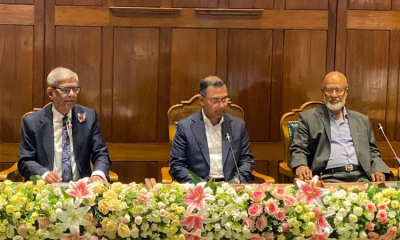Prime Minister Sheikh Hasina on Monday urged the Climate Vulnerable Forum (CVF) and the Commonwealth members to work together to act as a catalyst for implementing the Paris Agreement as no country is immune from the grave consequences of climate change.
“With more than one-third Member States of the CVF being also the members of the Commonwealth, I firmly believe that the joint efforts of the CVF and the Commonwealth members can act as a catalyst for the implementation of the Paris Agreement,” she said, adding that the Commonwealth countries have a long history of commitment and contributions in addressing the challenges of the climate change.
The prime minister said this while addressing the CVF-Commonwealth High-Level Panel Discussion on Climate Prosperity Partnership at the Commonwealth Pavilion in COP26 venue in Glasgow, Scotland as the chief guest.
Sheikh Hasina, also the CVF chair, raised six points for effective collaboration between the CVF and Commonwealth.
In the first point, she said: “We need to increase knowledge sharing, research and capacity building and technology transfer among the members for achieving sustainable, green and nature-based solutions for our prosperous future.”
“Second, our common position can help us secure the annual 100 billion dollars for climate financing by the developed countries for the developing countries, as promised in the Paris Agreement. The climate financing has to be in addition to the existing and future ODA. This amount should be allocated with the ratio of 50:50 between adaptation and mitigation,” she said.
In the third point, the prime minister said, the issue of climate migrants – the people displaced from their ancestral homes and traditional jobs because of the adverse effects of climate change, including sea-level rise, increasing salinity, river erosion, floods and droughts need to be discussed.
“And there has to be global responsibility for the rehabilitation of these people,” she added.
In her fourth point, Hasina said: “Our united actions can act as a force for the major emitting countries to declare their ambitious and aggressive NDCs to keep the global temperature rise at 1.5 degrees.”
“Fifth, transfer of clean and green technology to developing countries at affordable costs, including for meeting energy requirements, is very important. At the same time, the development needs of the CVF and the Commonwealth members will have to be taken into account,” she said.“Finally,” Hasina said: “Together we must try to find pragmatic, inclusive and locally-led solutions to tackle climate change.”
Mentioning that climate change is a global and cross-border issue now, she said: “No country is immune from its grave consequences. The increased number of climate disasters and their impacts have brought the vulnerable countries to a tipping point of unalterable damage. These’re affecting global food, energy, health and economic securities.
”The prime minister said the recent Intergovernmental Panel on Climate Change (IPCC) report gives a clear message that all have to take urgent and decisive actions to save our planet and future generations.
She said the 48 members of the CVF account for only 5% of the total global emission. “However, the adverse impacts of climate change have posed fundamental threats to our lives and livelihoods.”
Besides, the prime minister said, the Covid-19 pandemic has proved the significance of effective cooperation and collaboration for robust, bold and responsive action by the international community.
“Our vulnerability and necessity for adequate climate finance and technology transfer must be recognised by the international community. The major emitting countries need to fulfil their obligations to support us in CVF efforts to cope with the effects of climate change,” she said.
Hasina said Bangladesh is often referred to as Ground Zero for adverse impacts of climate change. “Despite our vulnerabilities and resource constraints, we have adopted exemplary initiatives to tackle climate change. Recently, we submitted an ambitious and updated NDC to the UNFCCC.”
Hasina said Bangladesh has launched the “Mujib Climate Prosperity Plan” to transform our climate vulnerability into climate prosperity by following a low-carbon development path.












-20260217073221.webp)




-20260216115008.webp)














